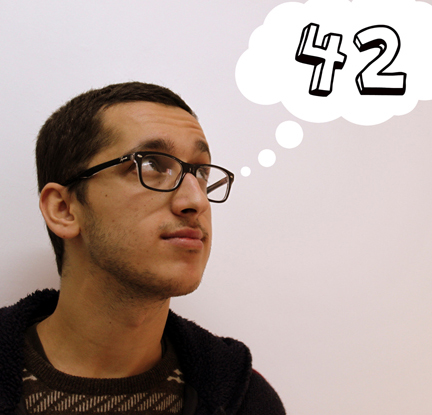Statement of Nervous

BY CÜNEYT YILMAZ (ECON/IV)
cuneyt_y@ug.bilkent.edu.tr
It's quite easy to fascinate your mother, if she's anything like mine.
Last summer, when one of my Erasmus friends felt the urgent need to make an international call from Portugal to talk to me in Turkey - you know, just to make sure they went bankrupt, as though they hadn't almost already - my mother happened to be within hearing distance. Listening to her son speak English, she was enthralled, to say the least.
"Oh my!" she exclaimed, "So you can actually speak English, huh?!?" Ironically, this was right after I had said "Ate ja!" to my friend, just to wipe out the last crumbs of Portuguese that had stuck in my mind. "Indeed I can," I responded to her in a calm manner, adding a little bit more to her amusement with my nonchalance. But grad schools are nowhere near my mom - or any mother for that matter - since it takes a whole lot of effort to convince them of your awesomeness. Taking TOEFL was a step in that direction. And now that my results have arrived, it's time for me to move on to the next big thing: Statement of Purpose.
The statement of purpose is a one thousand-wordish essay where you try to convince the admissions committee why you stand out from the rest of the applicants, who, for the very same reason, also claim to stand out from everyone else. Now, in a crowd where everyone is standing, the wise thing to do would actually be to sit, but that won't do the job here. Instead, throughout your essay, you need to respond to a few questions, which, most of the time, are put forth by the institution you're applying to. And even if they haven't done this, take a moment before scaring the bejesus out of yourself. Because, in this very column, I'll spare you the burden of googling the subject by providing you with an outline of what might be considered the essentials of a statement of purpose.
As the name indicates, to write a Statement of Purpose (aka SOP), you first need a purpose. But when it comes to applying for graduate study, which in terms of the toughness of the decision resembles a two- to four-year-long marriage, it's not easy to concoct a story right out of the blue. Yearning to have those three letters after your name probably doesn't count as a purpose either, unless that's the last wish of your mother on her deathbed - which is a clichéd lie anyways, so don't you dare try using it!
If you think you've expressed your purpose successfully, then I advise you to next write a little bit about the area of the study you wish to specialize in, because most institutions love to hear about this. And if you're a doe-eyed pupil reading this in your early years, pull yourself together and start developing some interest in at least a few subjects.
From what I've seen, your background and how you relate that to your future studies is also very important to these picky so-and-sos. It kind of makes sense; because, after all, there's no better guarantee for what you're going to do than what you've already done. If you're thinking of working on Poor Economics, for example, being poor may help you a lot with getting accepted. I'm not as optimistic, however, when it comes to my occasional whinging in this column and its relation to my graduate study.
 Just like people, universities have egos too. So it's a good time to use your bootlicking skills. I mean, would you be kind enough to tell them why you are applying to their university? Why that particular one, and not Yale or Princeton? Oh, is it your GPA? Well, sorry to tell you this, but no one will want to hear that. So be a lamb and come up with something better, will you?
Just like people, universities have egos too. So it's a good time to use your bootlicking skills. I mean, would you be kind enough to tell them why you are applying to their university? Why that particular one, and not Yale or Princeton? Oh, is it your GPA? Well, sorry to tell you this, but no one will want to hear that. So be a lamb and come up with something better, will you?
Talking about all this makes me wonder, though. Why do I want to do this with deep-down certainty, really? What is the actual rationale behind my applying for another degree in economics? Why do I not simply content myself with an average job and its average wages?
See, I believe in the power of language. Most of you probably haven't gotten to read my Turkish prose yet, but I'd like to think that I'm doing a good job there. This is partly because, well, Turkish is my native language; but more importantly, because I like to wander around the risky streets of language trying out new stuff. As for English, well, if anything, I haven't gotten fired yet so I guess things are all right here too. Economics is, for that matter, also a language I want to be able to speak. It's a means of communication that's valid everywhere. It's only through the vocabulary of economics that you can communicate with everyone (okay, maybe music too, but still…) - be it my mom or a Zimbabwean government official. And why bother talking if you aren't understood?
As I write this, I'm listening to a remix of Adele's "Someone Like You." This is for the schools that reject me: "Never mind, I'll find someone like you. I wish nothing but the best for you, too."
I wish my mother was here to see me writing this. I'm sure she would be enthralled.